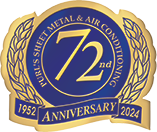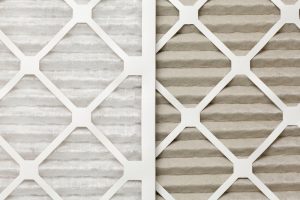When it comes to improving indoor air quality, many homeowners turn to whole-house air filters in Fresno, CA. But selecting the right air filter strength is more complex than you might think. It’s not just about picking the filter with the highest rating—choosing the wrong one can negatively affect your HVAC system’s performance and efficiency.
Let’s take a closer look at how filter strength is measured, why it matters. We can help you select the right solution for your home.
What Is a Whole-House Air Filter?
First, it’s important to understand that the filter already installed in your HVAC cabinet isn’t meant to clean the air inside your home. That standard filter keeps dust and debris from damaging the interior components of the system. A whole-house air filter, on the other hand, is designed to trap airborne particles throughout your home—such as dust, allergens, mold spores, and pet dander—before they recirculate into your living spaces.
Whole-house filtration is installed within the ductwork, where it will affect all the air circulating through your home. Selecting the right filter strength for this setup is essential to ensure good air quality without harming your system.
Understanding MERV Ratings
Filter strength is primarily measured using the MERV rating, which stands for Minimum Efficiency Reporting Value. The MERV scale ranges from 1 to 20, with higher numbers indicating a filter that can trap smaller particles. Here’s a quick breakdown:
- MERV 1–4: Basic filters that trap large particles like dust but do little for air quality.
- MERV 5–8: Better for homes, capturing common allergens such as dust mites and pet dander.
- MERV 9–12: Can trap mold spores, smoke particles, and fine dust.
- MERV 13–16: Hospital-grade filters that remove bacteria and viruses.
- MERV 17–20: Includes HEPA filters, which can capture 99.97% of microscopic particles like mold spores and even some viruses.
It might sound like a good idea to get the highest-rated filter possible, but bigger isn’t always better. An overly strong filter can restrict airflow and put unnecessary strain on your HVAC system.
Why the Right Filter Strength Matters
Whole-house air filters can make a significant difference in air quality, but using the wrong strength filter can backfire. When airflow is restricted by a filter that’s too dense—such as a high MERV or HEPA filter—it forces your HVAC system to work harder. This extra effort can result in:
- Reduced energy efficiency: The system needs more power to push air through a dense filter.
- Increased wear and tear: Constant strain on the system can lead to premature component failures.
- Inconsistent heating and cooling: Poor airflow can make it difficult to maintain the desired indoor temperature.
While HEPA filters are fantastic in settings like hospitals or cleanrooms, they aren’t always appropriate for residential HVAC systems. These systems are typically not designed to handle the airflow restrictions imposed by such dense filters.
Working with experienced HVAC experts like us is the best way to ensure you get the benefits of clean air without harming your HVAC system. If you’re ready to upgrade your home’s air filtration or need help selecting the right filter strength, contact us today. We’ll help you breathe easier and keep your system running at peak performance!
Contact Purl’s Sheet Metal & Air Conditioning for improvements to your home’s indoor air quality. Uncompromised Quality & Customer Service Since 1952.


